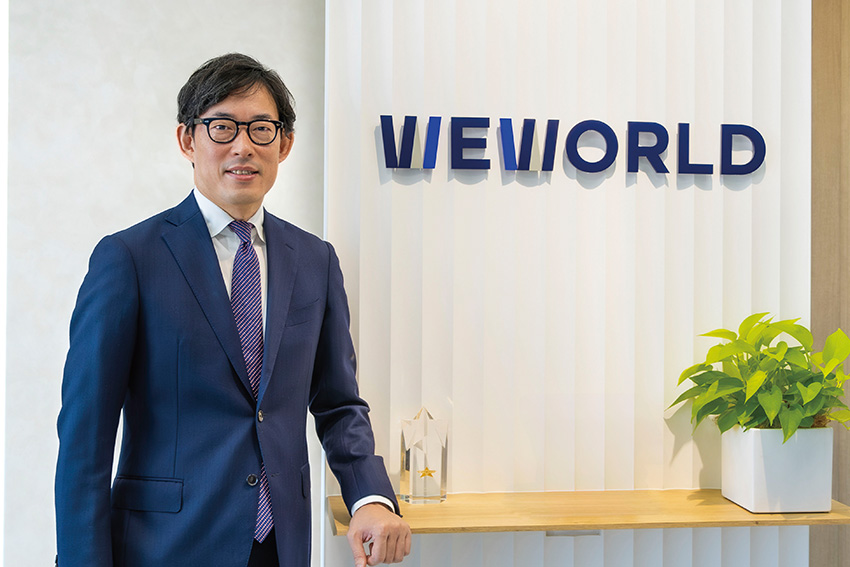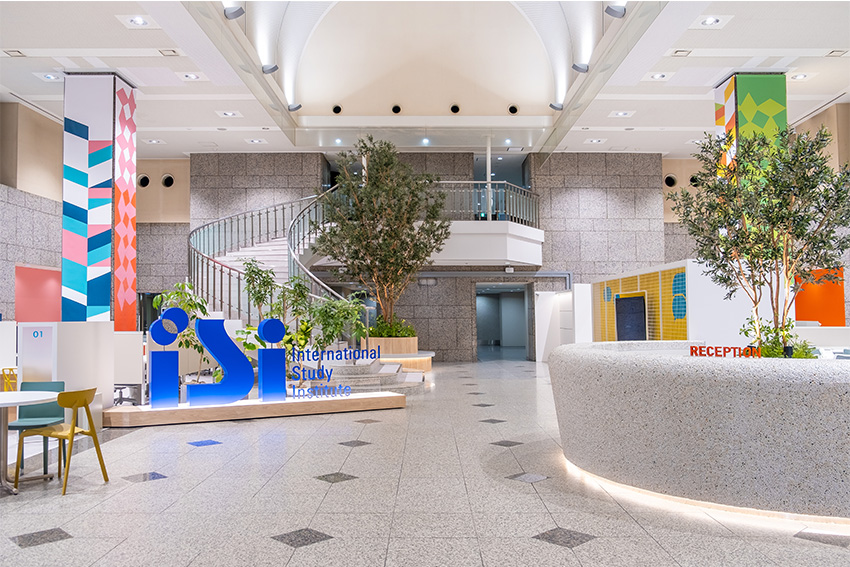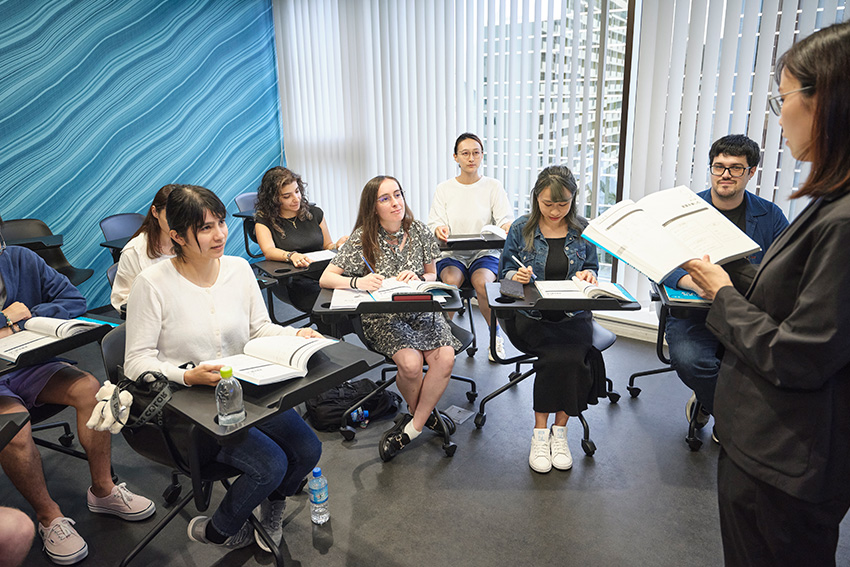WEWORLD aims to provide a total platform for global talent development by providing a path for students to learn, build their careers, and connect with the world.

One of the major challenges facing Japan today is its changing demographic composition. Japan has the world's most rapidly aging and shrinking population, and experts believe that a shrinking population will result in a labor shortage of 11 million people by 2040.One strategy to address this problem is the government's plan to attract 400,000 foreign students to Japanese universities. From your business perspective, what role does an organization such as yours play in addressing these pressing issues?
Our role as a Japanese language school is to serve as a bridge between Japanese society and foreign human resources. As the working population decreases, the demand for foreign workers is increasing. Japanese language skills are fundamental for foreign personnel interested in working in Japan. Being an island nation, Japan has a unique culture that needs to be understood. Our role is to serve as a bridge so that foreign personnel can integrate into Japanese society through study and work over the short, medium, and long term. We do this by providing language and cultural understanding classes and by making the best matches with companies.
Statistics show that Japan lags the rest of the world with only about 5% of its student population coming from abroad. Compare this to the United Kingdom and the United States, where approximately 30% to 40% of the student population in both countries comes from abroad, a significant difference. Japan should be a very attractive place to study, as it is well equipped and known as a very safe country. In addition, the historically low yen has made Japan more cost-effective than ever as a study destination. From your perspective, what is the added value of studying in Japan?
There are two main attractions to studying in Japan. First, the quality of education is high, as evidenced by the world university rankings. With the depreciation of the yen and lower tuition fees than in Western countries, it is currently very cost-effective to study in Japan.
Looking at the Asian region, the competition for admission to top tier universities is very stiff, whereas Japanese universities are really welcoming, especially to international students, and the entrance exam hurdles are low. The low competition factor is certainly an attractive point.
One of the major criticisms of Japanese universities is that it is difficult for international students to find employment opportunities after graduation. Of course there is the language barrier, but in addition to that, Japan has a very rigid hiring schedule and process. One of the key pillars of your business is educating students for lifelong graduation. How do you prepare students for post-graduation? Are there any examples of students who have been able to find employment after graduation with your assistance?
In addition to the Academic Japanese Course, we offer the Career Japanese Course, which is designed to help students find employment in Japan. In addition to learning the Japanese language necessary for business, students receive extensive instruction in Japanese business etiquette, job application documents, and job interviews.
We also hold job hunting classes at our school and job-hunting events to introduce and match students with companies. Recently, we have been recognized by human resource managers of companies and actively participate in opportunities to introduce companies to students.
With this background and track record, our job placement assistance has developed into a recruiting business. We have already succeeded in matching students with many companies and will grow it into another pillar of our business soon.
I understand that WEWORLD is currently expanding and plans to open a new campus in April 2025 with a capacity of 4,500 students. What strategies are you employing to attract more students to the new campus?
The new Shinjuku School has already completed recruiting students for its April opening and is ready to accept 4,000 students from the start. This includes many students preparing for university entrance exams, and the accompanying college preparatory school business will provide them with an optimal learning environment. Our strategy is based on providing comprehensive services to meet the needs of our students.

New Shinjuku Campus

New Shinjuku Campus
Why did you decide on the new company name "WEWORLD"? What do you hope this rebranding will represent?
ISI Global and ISI Japanese Language School were previously known as ISI Global and ISI Japanese Language School, using ISI, the abbreviation for International Study Institute. Since then, we have been diversifying our business with education at the core, and we have changed our company name as we expand our business to become a comprehensive human resources company by adding a new human resources business. The company name inherits and expresses our corporate purpose of "Empowering People, Building Dreams, Connecting Worlds."
In addition to offering language courses, your company now focuses on recruitment and placement. There are many recruiting and education companies in the market, and by combining the two, we can create a new business model. What is your company's unique operating system? What differentiates you from your competitors in the race for talent?
Our strength is our direct connection with students through the Web and our extensive global network, including agencies. Through this network, we have been able to consistently attract a significant number of students to our schools, and with the opening of our new Shinjuku campus in April, we filled our capacity early last year and expect to exceed 4,000 students in the first year. As an extension of our post-graduation career guidance for these many foreign graduates and considering the growing need for foreign human resources from the corporate side, it was a natural step for us to embark on the job placement business. As a Japanese language school, we are familiar with each student's abilities, work experience, and daily classroom behavior, and we can serve as a trustworthy agent for our corporate clients. The fact that we have already obtained many placements for our students shows the correctness of our strategy, and we believe this is what differentiates us from our competitors.

Students in language class
Your school currently enrolls students from over 120 countries. Looking to the future, are you interested in expanding your global network of exclusive partnerships? If so, which countries and markets are you targeting?
We are always looking for new partnerships, especially since many of our students have the goal of going on to university or finding employment. From the perspective of reducing the cost of studying in Japan, it is also very beneficial to partner with foreign language schools and vocational schools. As an example, we offer Japanese language classes at our partner international high schools in China so that students can begin preparing for the Japanese university entrance exam at an early stage.
In 2021, your company received a strategic investment from the Japan Industrial Promotion Organization Group (NSSK), not only to expand its business but also to acquire Tokyo Language Education Academy. Do you intend to remain active in acquisitions?
M&A is a potential option in our growth strategy.
Imagine us returning on the last day of your presidency and conducting this interview again. What goals or dreams do you hope to accomplish by the time we return for a new interview?
I envision that WEWORLD will be an institution that is deeply rooted in Japanese society and provides comprehensive solutions to alleviate the various problems that Japan faces. By connecting Japan and the world through quality education, we can solve some of the biggest social problems facing Japan. We expect that in the future, WEWORLD will contribute to solving many social issues as one of the top companies in the industry.
For more information, please visit their website at:
0 COMMENTS